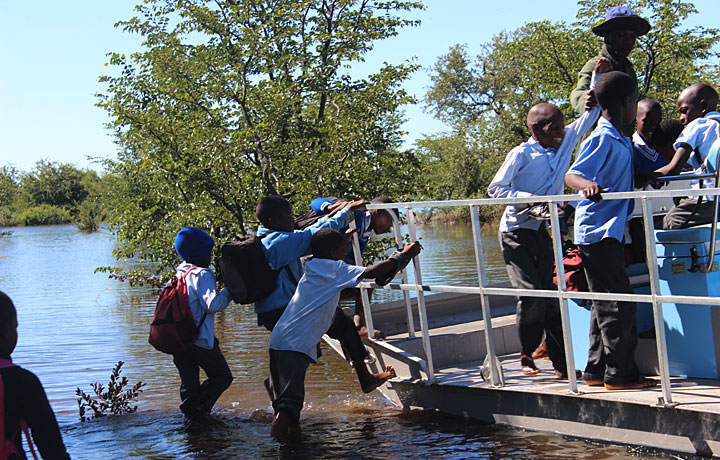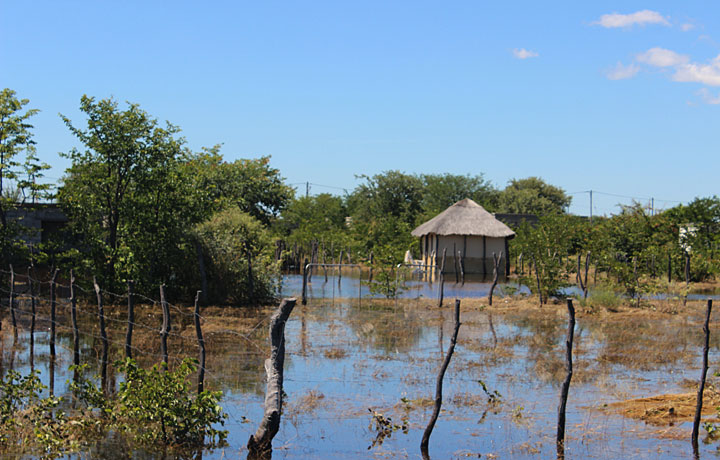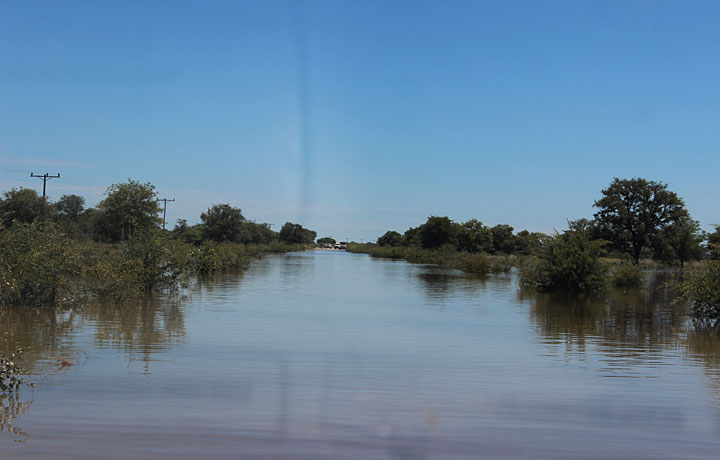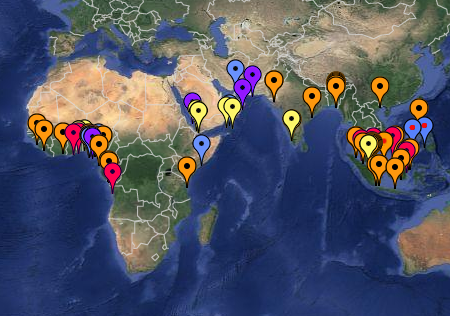It feels good to go to school on an airboat
published: 17 March 2017
by: Kabelo Dipholo
“I just wish this water could stay forever. It feels good to go to school on an airboat.”
An excited Standard four Gweta Primary school pupil made the above statement, as he got off an airboat, oblivious of the dangers facing his flooded village.
Situated 285 km north of Francistown, the normally dry village was turned into a tropical forest overnight by the recent torrential down pours associated with ex-cyclone Dineo. Transport mode immediately changed from the usual donkey cart and hamba bicycles to a more thrilling airboat.
Together with my colleague Dubani we boarded an 8 am Kasane bound Iveco from Francistown on Tuesday on a fact-finding mission.
Alighting from the bus at a filling station in Nata, we joined hitchhikers at the bus stop. Public transport has been a nightmare for commuters between Maun and Francistown.
Gweta and Zoroga villages have been flooded and the A3 road rendered impassable, cutting off the three villages from the rest of the world. “On a bad day we may have to go back home and hitch hike again the next morning,” said an exasperated young lady leaning on a trashcan. “I have been here since 9 am,” she added as she shielded her head from the scorching sun with a newspaper. I quickly glanced at my watch. It’s 11:35 am and we didn’t have the luxury of trying another day. My editor did not send us on a holiday. She expected a report first thing in the morning. We backtracked to the filling station hoping to approach cars before making a turn to the hiking spot. We got a chance to board the airboat and assess the water levels and damage in the village. We navigated through bushes and there’s not a soul in sight, social life in the village is has come to a sudden halt. The football field is fully submerged and only the crossbars are visible.
The damage is unmistakable, but its extent would be felt once the water subsides and farmers start counting decaying carcasses. One can only hope that this water will find its way home to fill up pans and lakes, and that dry land ceases to be a luxury in Gweta. The natives are longing to go back to their donkey carts and black hamba bicycles after all.
It was a masterstroke! Within 10 minutes we were sitting pretty in a 4X4 Nissan Navara as we drove past the hiking lot who enviously stared at us. The Nissan driver introduced himself as Slux and said he was on his way to work. His work was to help people cross the raging water using his employer’s tow truck. Just the man we were looking for! We arrive at the water point in Zoroga. We were not prepared for what we saw. Although Slux keeps reminding us that the situation had significantly improved, I kept wondering why Zoroga and Gweta were not declared national disasters?
Could it be because these are obscure villages far away from the prying eyes of the media? After a quick interview with Slux’s boss who made a killing through ferrying smaller cars across the water, we hitched a ride in another Navara 4×4 and headed to Gweta. It was when we arrived at the Gweta Primary Hospital that reality sunk in.
Nurses and Hospital staff have sought refuge within the hospital premises, as their staff houses have been rendered uninhabitable. The entire area around the hospital is covered in water and villagers on the other side rely on the airboat provided by the council. Inside the hospital our cameras immediately attract attention. We got wind that Botswana Land Board and Local Authorities Workers Union (BLAWU) Executive Committee members had come to donate some foodstuffs, mosquito repellents and water to their members at the hospital. Our excitement was however short lived as it was made clear that we would not be allowed anywhere near the nurses as they received their much needed relief.
Apparently government is worried that the whole disaster was not handled well and want the private media not anywhere near Gweta if possible.
The hospital Matron is under instructions not to address the media unless she had permission from the Permanent Secretary.
It seemed we had hit a dead end. Wait a minute! Why is BLAWU bringing bottled water to a village floating in endless gallons of water?
It is at this point that we learn that Gweta is drowning in thirst. There is not a single drop in all the taps within the hospital.
In fact it is common to see hospital staff leaving with five liter bottles full of the precious liquid drawn from JoJo tanks within the compound.
The thirst is not limited to the hospital alone; the primary school taps also cough and splutter when turned on.
Villagers are in desperate need of portable drinking water, they dread the water, which forced its way into their living rooms, killed their livestock and submerged their ploughing fields.





